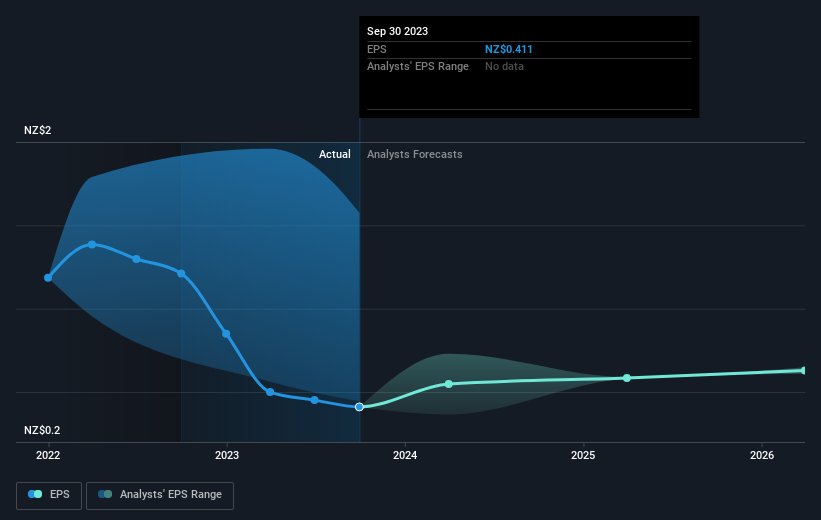Stock Analysis
- New Zealand
- /
- Healthcare Services
- /
- NZSE:RYM
Ryman Healthcare (NZSE:RYM) stock falls 3.2% in past week as three-year earnings and shareholder returns continue downward trend

If you love investing in stocks you're bound to buy some losers. But long term Ryman Healthcare Limited (NZSE:RYM) shareholders have had a particularly rough ride in the last three year. Regrettably, they have had to cope with a 70% drop in the share price over that period. More recently, the share price has dropped a further 21% in a month.
With the stock having lost 3.2% in the past week, it's worth taking a look at business performance and seeing if there's any red flags.
See our latest analysis for Ryman Healthcare
In his essay The Superinvestors of Graham-and-Doddsville Warren Buffett described how share prices do not always rationally reflect the value of a business. One way to examine how market sentiment has changed over time is to look at the interaction between a company's share price and its earnings per share (EPS).
Ryman Healthcare saw its EPS decline at a compound rate of 14% per year, over the last three years. This reduction in EPS is slower than the 33% annual reduction in the share price. So it's likely that the EPS decline has disappointed the market, leaving investors hesitant to buy.
You can see below how EPS has changed over time (discover the exact values by clicking on the image).

We consider it positive that insiders have made significant purchases in the last year. Having said that, most people consider earnings and revenue growth trends to be a more meaningful guide to the business. Dive deeper into the earnings by checking this interactive graph of Ryman Healthcare's earnings, revenue and cash flow.
What About The Total Shareholder Return (TSR)?
We've already covered Ryman Healthcare's share price action, but we should also mention its total shareholder return (TSR). The TSR attempts to capture the value of dividends (as if they were reinvested) as well as any spin-offs or discounted capital raisings offered to shareholders. Its history of dividend payouts mean that Ryman Healthcare's TSR, which was a 67% drop over the last 3 years, was not as bad as the share price return.
A Different Perspective
We regret to report that Ryman Healthcare shareholders are down 19% for the year. Unfortunately, that's worse than the broader market decline of 0.7%. Having said that, it's inevitable that some stocks will be oversold in a falling market. The key is to keep your eyes on the fundamental developments. Unfortunately, last year's performance may indicate unresolved challenges, given that it was worse than the annualised loss of 9% over the last half decade. We realise that Baron Rothschild has said investors should "buy when there is blood on the streets", but we caution that investors should first be sure they are buying a high quality business. It's always interesting to track share price performance over the longer term. But to understand Ryman Healthcare better, we need to consider many other factors. For instance, we've identified 4 warning signs for Ryman Healthcare (1 is concerning) that you should be aware of.
Ryman Healthcare is not the only stock insiders are buying. So take a peek at this free list of growing companies with insider buying.
Please note, the market returns quoted in this article reflect the market weighted average returns of stocks that currently trade on New Zealander exchanges.
Valuation is complex, but we're helping make it simple.
Find out whether Ryman Healthcare is potentially over or undervalued by checking out our comprehensive analysis, which includes fair value estimates, risks and warnings, dividends, insider transactions and financial health.
View the Free AnalysisHave feedback on this article? Concerned about the content? Get in touch with us directly. Alternatively, email editorial-team (at) simplywallst.com.
This article by Simply Wall St is general in nature. We provide commentary based on historical data and analyst forecasts only using an unbiased methodology and our articles are not intended to be financial advice. It does not constitute a recommendation to buy or sell any stock, and does not take account of your objectives, or your financial situation. We aim to bring you long-term focused analysis driven by fundamental data. Note that our analysis may not factor in the latest price-sensitive company announcements or qualitative material. Simply Wall St has no position in any stocks mentioned.
About NZSE:RYM
Ryman Healthcare
Ryman Healthcare Limited develops, owns, and operates integrated retirement villages, rest homes, and hospitals for the elderly in New Zealand and Australia.
Fair value with mediocre balance sheet.

